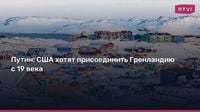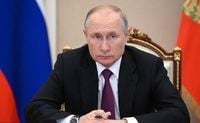In a striking address at the VI International Arctic Forum, President Vladimir Putin articulated a historical perspective on the United States' long-standing interest in Greenland, particularly in light of former President Donald Trump's assertions that the territory should be part of the U.S. Putin emphasized that these ideas are not merely extravagant musings of the current American administration but have roots stretching back to the 19th century.
Speaking on March 27, 2025, in Murmansk, Putin remarked, "It might surprise someone at first glance, but it is profoundly mistaken to think these are just extravagant discussions from the new American administration. Nothing of the sort." He pointed out that U.S. plans to annex Greenland and Iceland were considered as early as the 1860s, though they ultimately failed to garner congressional support.
Putin elaborated on the historical context, recalling that during the 1868 debate over the purchase of Alaska, American newspapers derided the idea, labeling it as "madness," "an icebox," and a "garden of white bears" under then-President Andrew Johnson. He remarked, "Therefore, the proposal for Greenland fell through. But today, the acquisition of Alaska is undoubtedly viewed quite differently in the United States, just as the actions of President Andrew Johnson are reassessed today."
He highlighted that the U.S. interest in Greenland did not end in the 19th century. In fact, he noted that after World War II, the U.S. deployed military bases in Greenland to guard against Nazi threats and later proposed to Denmark the purchase of the island. Putin stated, "In short, there are serious plans on the part of the United States regarding Greenland. These plans have deep historical roots, and it is evident that the U.S. will continue to systematically advance its geostrategic, military-political, and economic interests in the Arctic."
Amidst these assertions, Putin expressed concern over NATO's increasing focus on the Arctic as a potential conflict zone, indicating that Russia is vigilant about military activities in the region. He stated, "We are, of course, only concerned about the fact that NATO countries are increasingly designating the Far North as a platform for possible conflicts. They are practicing troop deployments in these conditions, including through their recruits from Finland and Sweden."
While acknowledging the historical context of U.S. ambitions, Putin also stressed that the relationship between Greenland and the U.S. does not involve Russia. However, he underlined that Russia is ready for equal cooperation in the Arctic with all interested parties, including Western nations, stating, "We are prepared to work together not only with Arctic states but with anyone who, like us, shares responsibility for a stable, sustainable future for the planet and can make balanced decisions that are calculated for decades to come."
Trump's administration had long expressed a desire for Greenland, with Trump himself stating that controlling the island was "an absolute necessity" for U.S. national security. The former president had even suggested that economic or military coercion might be used to secure control over Greenland. In response to these sentiments, Denmark increased its defense budget for Greenland, reflecting the heightened tensions surrounding the issue.
In a further development, a high-ranking American delegation, including the spouse of Vice President Usha Vance and National Security Advisor Mike Waltz, is set to visit Greenland, which Prime Minister Mute Egede has labeled a "provocation."
Putin's remarks come at a time when international cooperation in the Arctic is facing challenges, with the Arctic Council, established to facilitate such collaboration, reportedly degrading. He noted, "As they say in such cases: if you don't want to, then we don't need you."
He pointed to the significant logistics and economic potential of the Arctic region, which encompasses over a quarter of Russia's territory and is home to nearly 2.5 million Russians, contributing to 7% of the GDP and about 11% of exports. Over the last decade, cargo traffic along the Northern Sea Route has surged dramatically, from 4 million tons in 2014 to nearly 38 million tons in 2024, with expectations that it could reach 70 to 100 million tons by 2030.
Putin underscored the importance of the Northern Sea Route as a key part of the Trans-Arctic Transport Corridor, which is intended to connect major industrial, agricultural, and energy centers with consumer markets via a shorter, safer, and economically advantageous route. He outlined several tasks for developing this corridor, emphasizing the need to strengthen Russia's position as the owner of the world's largest icebreaker fleet.
Four new icebreakers of the 22220 series are already operational in the Arctic, with three more under construction, along with a powerful 120-megawatt icebreaker named "Russia." Putin called for the expansion of Russia's commercial fleet in the Arctic, including cargo and emergency rescue vessels, to ensure transport capabilities.
He also urged the government to support Russian shipbuilding and repair enterprises, advocating for the establishment of shipyards and the creation of favorable conditions for domestic operators engaged in Arctic transport. Putin noted that international logistics operators could invest in such companies, not only with capital and technology but also by contributing part of their commercial fleets.
In conclusion, Putin's statements reflect a complex interplay of historical ambitions, current geopolitical tensions, and future aspirations for cooperation in the Arctic. As the region becomes a focal point for international interests, the dynamics between the U.S., Russia, and other Arctic nations will undoubtedly shape the future of this strategically important area.








